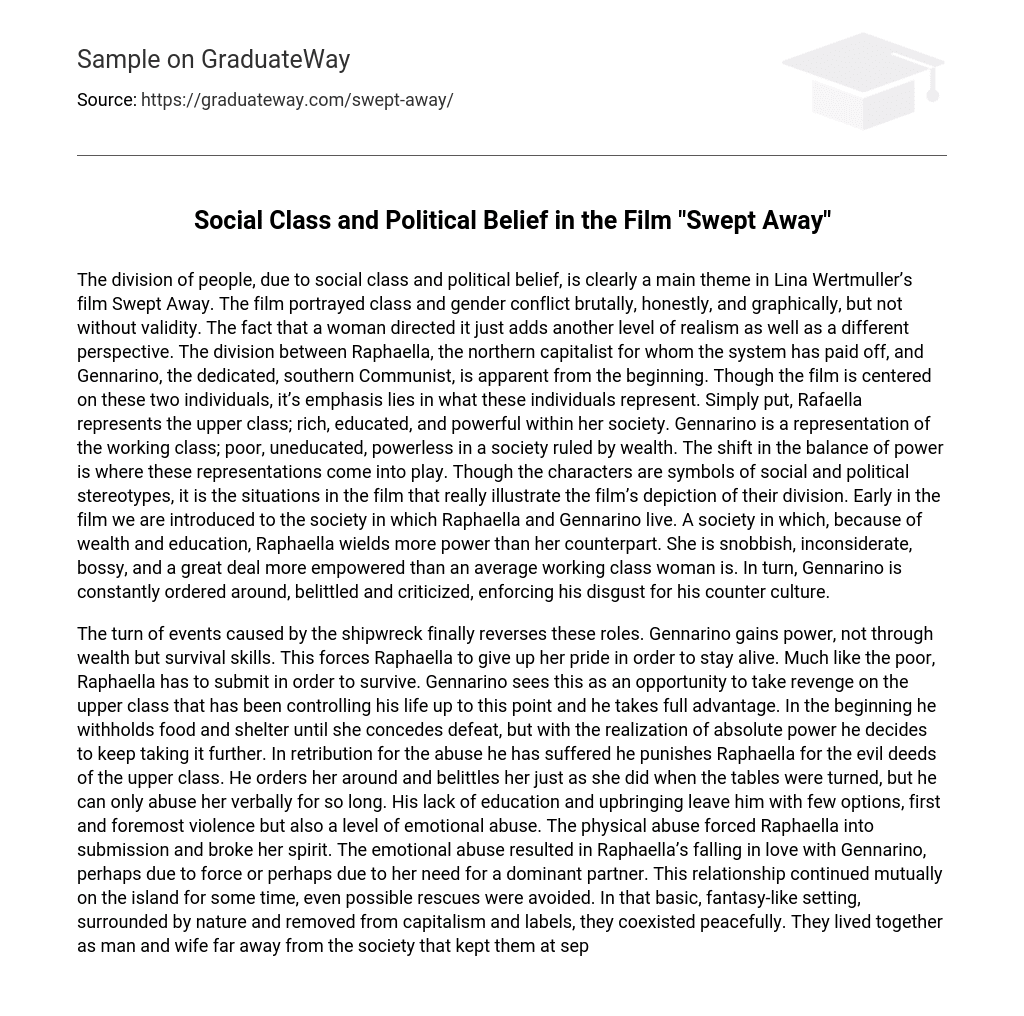Lina Wertmuller’s Swept Away examines the themes of social class and political beliefs, illuminating the intense conflicts that arise from these divisions. The movie expertly portrays the harsh realities and vibrant clashes between different classes and genders. What distinguishes this film is its female director, which adds an extra layer of authenticity and a unique perspective. From the outset, we can clearly observe the divide between Raphaella, a wealthy capitalist from the north who has prospered under the system, and Gennarino, a passionate communist hailing from the south. However, it is primarily through these two characters that symbolism and representation are explored in the film.
In essence, Rafaella embodies the upper class, characterized by wealth, education, and influence within society. Conversely, Gennarino represents the lower class, marked by poverty, lack of education, and powerlessness in a society controlled by the wealthy. These depictions become significant when power dynamics shift. While the characters serve as symbols of social and political stereotypes, it is the situations depicted in the film that truly illustrate the divide between them. At the start of the film, we are introduced to the social context in which Raphaella and Gennarino coexist—a society where Rafaella wields more authority due to her economic status and educational background.
She possesses snobbishness, lack of consideration, bossiness, and a significantly higher level of empowerment compared to your typical working-class woman. As a result, Gennarino is incessantly commanded, demeaned, and subjected to criticism, intensifying his disdain for his counterculture. However, the shipwreck’s turn of events ultimately reverses these dynamics. Gennarino acquires power not through affluence but by virtue of his survival skills. Consequently, Raphaella is compelled to relinquish her pride in order to endure. Similarly to the impoverished, Raphaella must submit to ensure her survival.
Gennarino perceives this opportunity as a means to seek revenge against the upper class who have controlled his life thus far, and he seizes it wholeheartedly. At first, he refuses to provide her with food and shelter until she surrenders. However, once he realizes his complete dominance, he intensifies the torment. In search of retribution for the mistreatment he suffered, he exacts punishment on Raphaella for the wrongdoing of the upper class. He dictates her actions and diminishes her worth, reflecting the treatment she subjected him to when their roles were reversed. Nonetheless, verbal abuse alone can only be inflicted on her for a limited duration.
Due to his lack of education and upbringing, options for him are limited. Violence is his primary choice, accompanied by emotional abuse. Raphaella was forced into submission through physical abuse, leaving her spirit shattered. The emotional abuse may have led Raphaella to fall in love with Gennarino, either due to coercion or a desire for a dominant partner. This unique relationship persisted on the island for some time, evading potential rescues. In this serene environment, surrounded by nature and disconnected from capitalism and societal labels, they peacefully coexisted.
They lived together as a couple in seclusion, isolated from the rest of society. However, Gennarino decides to challenge their love by reintegrating into their former society. In this realm, it becomes evident that the one who genuinely fell in love was Gennarino, not Raphaella. Upon returning to her previous life, Raphaella reverts back to her old behaviors and beliefs, implying that she might never truly transform. Within her community, she becomes captivated by power and wealth, perceiving them as essential for survival. The movie offers a fresh perspective by eliminating individual representation and instead highlighting the struggle between social classes, a contest for power, and a clash between traditional norms and an evolving world.
The film’s final scene encapsulates its main message. Gennarino’s wife, harboring frustration over his affair, assumes control while he obediently follows behind, carrying her suitcase. This symbolizes his reintegration into society and reclaiming of his role within it. Surprisingly, Gennarino’s wife now holds the power as he takes on a submissive position.





